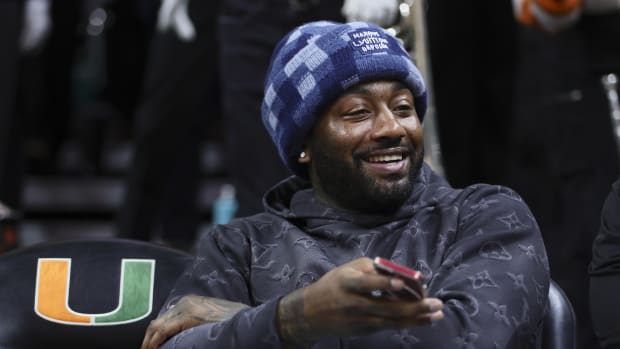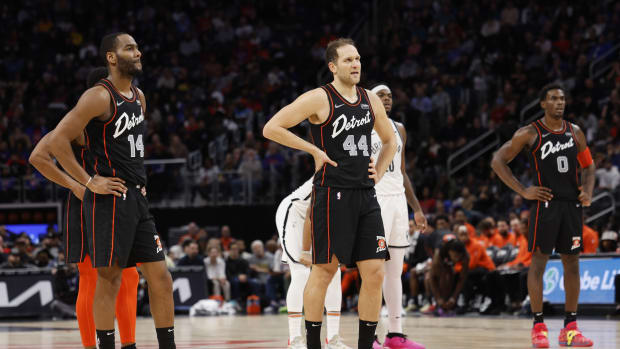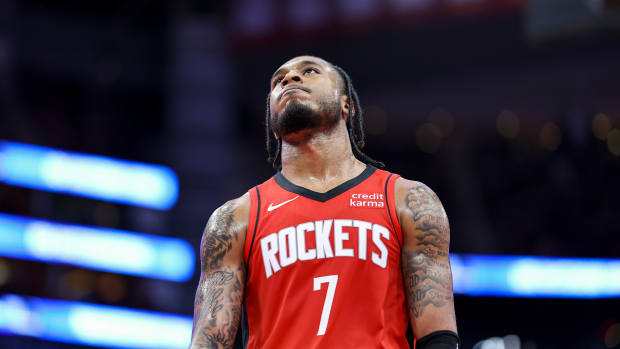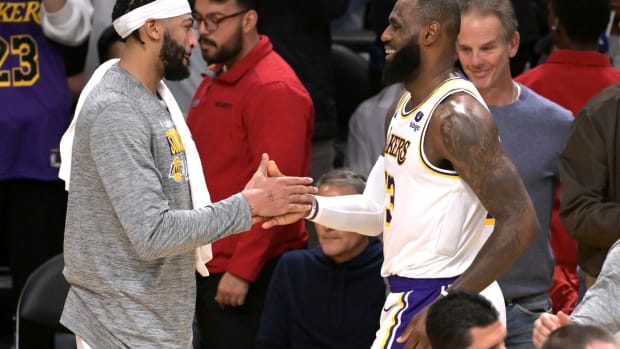Day 1 Playoff Impressions: Sixers' Flop, Kyle Lowry’s Struggles and the Spurs' Inevitability
The postseason is finally here and the NBA rewarded us with some sweet, sweet ‘yoffs action Saturday, which saw two massive upsets in the East, an energetic Warriors win and the Spurs Spursing in Denver. It is always incredibly easy to overreact to Game 1 of any given series, and frankly, often very fun. But I’m not quite ready to put nails into the coffins of the Sixers, Raptors and Nuggets (and all those teams actually have some reasons to believe it’s going to be okay.) Instead, let’s run through each game from Day 1 and discuss some of my first impressions.
Nets 111, Sixers 102
It’s really up to Ben Simmons to change the narrative about the kind of player he is going to be in the postseason. It’s hard to remember now, but he actually ran roughshod over the Heat in his first playoff series last year, but he’s struggled ever since. A big issue for Simmons is his flaws—like his lack of shooting—are magnified when the pace slows. The Sixers had only 99 possessions in their Game 1 loss to the Nets, a drop from their season average of 102.6. (Philly’s pace in the regular season whenever Simmons was on the court was even higher at 104.6.) There are going to be problems for Simmons in the halfcourt, and those will be exacerbated if shots aren’t falling around him. A huge key to Philly’s success is its three-point shooting, and the Sixers shot a pitiful 3-of-25 from three Saturday. (That could end up being as big a reason for the loss than anything else in what was a relatively close game.)
Brett Brown can help Simmons by finding ways to let him play faster, though this is a longstanding concern for a team that also heavily relies on a back-to-the-basket player in Joel Embiid. Speaking of Embiid, he clearly did not look healthy in Game 1. He played better in the second half, doing more work inside the three-point line, where he settled too often in the first two quarters. That can probably be traced to his gimpy knee, which definitely hindered his ability to fight for deep post position and then run back to defend the paint. There are no easy fixes at this point for Embiid, though his second straight injury-clouded playoff run should make Philly reconsider how to use him in the regular season.
The silver linings for the Sixers? The starting lineup easily won in the minutes they played together, even with Embiid’s inefficient night and J.J. Redick’s overall ineffectiveness, and they played with good pace. It’s also going to be really difficult for Philly to recreate its poor shooting performance from the outside again. Hope is not lost for the Sixers.
(The Nets, meanwhile, largely won this game at the three-point and free-throw lines. The bench also played really well, with Ed Davis looking like the best big on the floor for stretches. Brooklyn appeared to be the much deeper team in Game 1. If injuries keep hurting Philly, or Redick and Simmons can’t mitigate their flaws, that Nets bench could continue to be a big factor. Davis, Spencer Dinwiddie and Caris LeVert all played very well Saturday.)
Magic 104, Raptors 101
There’s just no excuse for the Kyle Lowry no-show. Defenders will point to his plus-11 while he was on the court, but Lowry—who finished with 0 points in 34 minutes—was thoroughly outplayed by journeyman guard D.J. Augustin, who hit the game-winning three in Orlando’s 104–101 win. With that said, Orlando won this game in the margins. The Magic shot a better percentage from three, and dominated the Raptors at the free-throw line. And that was just barely enough to overcome so-so performances from everyone outside of Kawhi Leonard and Pascal Siakam.
Lowry is probably going to hit some of the shots he missed in Game 1. The more pressing issue is how the Raptors played down the stretch. The miscommunication between Leonard and Marc Gasol on Augustin’s game-winner is the kind of thing that should be cleared up well before the playoffs begin. Toronto also poorly handled the clock down the stretch, missing an opportunity for a two-for-one in the final 35 seconds.
And even with all of that ... this is likely a different conversation if Gasol makes a wide-open corner three that was halfway down before rimming out on Toronto’s second-to-last possession. I’m not too worried about the Raptors' loss, which came down more to a lack of execution as opposed to a bigger structural issue, the kind of thing that typically eventually favors the better team over the course of a series. (It would also help if Leonard played more than 33 minutes.)
Clippers 104, Warriors 121
There’s not much to say about this one. The talent disparity is huge. Kevin Durant getting tossed only matters in the context of the long run, and maybe he’ll have to worry about racking up techinicals by the conference finals. Golden State practically controlled this game from the tip. Patrick Beverley briefly disrupted Durant, but he can only keep KD down for so long. And Beverley’s efforts don’t really matter if Stephen Curry scores 38 on 8-of-12 shooting from three. (Curry also had 15 rebounds and seven assists.) This game made the most sense out of the first four of the playoffs. One maybe interesting thing to keep an eye on? DeMarcus Cousins was a minus-17 in his 21 minutes.
Spurs 101, Nuggets 96
Saturday’s nightcap didn’t even feel like an upset. The Spurs stole homecourt from the Nuggets by absolutely junking up Game 1. The game was played at a snail’s pace of 93.5. (The Grizzlies had the slowest average pace during the regular season at 97.2. Denver’s season average was 98.5) San Antonio played deliberately and the inexperienced Nuggets didn’t seem to properly value their possessions. Nikola Jokic was too passive, shooting only nine times en route to a 10-point, 14-assist, 14-rebound triple double. Jokic is the team’s best player, he needs to force the action more offensively.
The loss certainly wasn’t Jokic’s fault. The Spurs threw constant doubles his way, and Jokic showed trust in his teammates. Will Barton and Jamal Murray combined to shoot 14-of-39 from the field, including a bricky 1-of-11 from three. As a team, Denver shot only 6-of-28 from behind the arc. (The Nuggets hit less threes than the Spurs, who hit seven despite only attempting 15.) It really feels like Denver gave this game away. Every time the Nugs mounted a comeback, they couldn’t quite get over the hump.
The Spurs’ stars didn’t play too great, with LaMarcus Aldridge and DeMar DeRozan combining to hit only 33.3% of their field-goal attempts. San Antonio’s role players were fantastic, particularly Derrick White, who was a menace on both ends of the floor. Rudy Gay and Bryn Forbes also contributed solid performances.
Denver doesn’t need to panic. The Nuggets can win even playing at the Spurs’ preferred pace. (And Jokic also did his part defensively!) But it is unnerving that this inexperienced group lost its first game together in the postseason, and Gregg Popovich will undoubtedly have more tricks up his sleeve as the series continues. Denver definitely needs to tighten up its execution—and make some more open shots—but Mike Malone’s most important task may end up being keeping the composure of his young team.


































